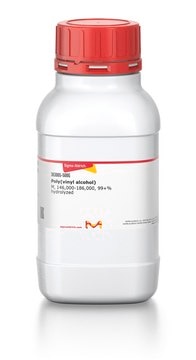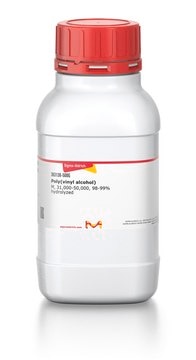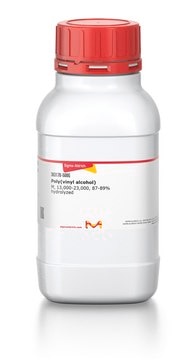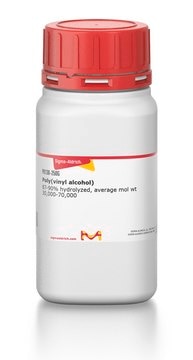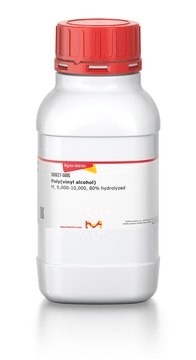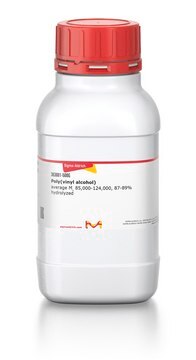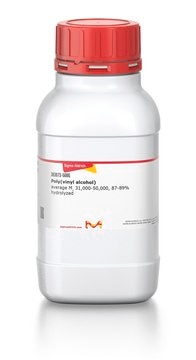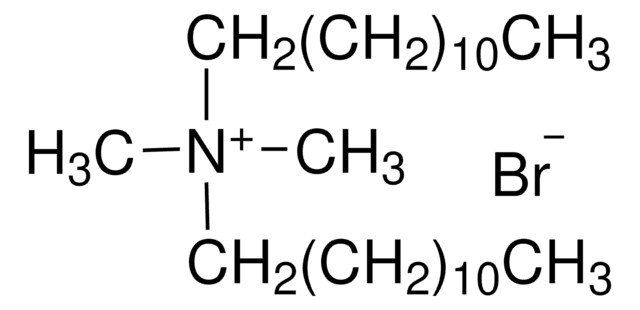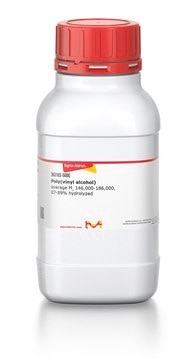363146
Poly(vinyl alcohol)
Mw 85,000-124,000, 99+% hydrolyzed
Synonym(s):
PVA
Sign Into View Organizational & Contract Pricing
All Photos(2)
About This Item
Linear Formula:
[-CH2CHOH-]n
CAS Number:
MDL number:
UNSPSC Code:
12352104
NACRES:
NA.23
Recommended Products
Quality Level
form
powder or crystals
mol wt
Mw 85,000-124,000
falling ball
28-32 cP, 4 % in H2O(20 °C)(lit.)
InChI
1S/C2H4O/c1-2-3/h2-3H,1H2
InChI key
IMROMDMJAWUWLK-UHFFFAOYSA-N
Looking for similar products? Visit Product Comparison Guide
Related Categories
General description
Poly (vinyl alcohol) (PVA) is a useful industrial, medical and biomimetic material. PVA with high molecular weight is useful in preparing gel which possesses both high strength and modulus. Hence, it is used for the production of fibers, films or gels.
Application
- Poly (vinyl alcohol) recent contributions to engineering and medicine: This article discusses the diverse applications of PVA in engineering and medical fields, emphasizing its versatility and potential in various domains (Feldman, 2020).
- Chemical modification of poly (vinyl alcohol) in water: This study explores the chemical modification processes of PVA, enhancing its functional properties for advanced material applications (Awada & Daneault, 2015).
- Crosslinked poly (vinyl alcohol) hydrogels for wound dressing applications: Reviews the use of PVA in creating hydrogel dressings for medical applications, demonstrating the material′s effectiveness in healing and treatment scenarios (Kamoun et al., 2015).
- A review on mechanical and water absorption properties of polyvinyl alcohol based composites/films: This review focuses on the mechanical and water absorption properties of PVA composites, crucial for developing advanced materials in various scientific and industrial applications (Jain et al., 2017).
- Properties and applications of polyvinyl alcohol, halloysite nanotubes and their nanocomposites: Analyzes the synthesis, properties, and applications of PVA-based nanocomposites, highlighting their significant potential in nanotechnology and material science (Gaaz et al., 2015).
wgk_germany
WGK 1
flash_point_f
No data available
flash_point_c
No data available
ppe
Eyeshields, Gloves, type N95 (US)
Certificates of Analysis (COA)
Search for Certificates of Analysis (COA) by entering the products Lot/Batch Number. Lot and Batch Numbers can be found on a product’s label following the words ‘Lot’ or ‘Batch’.
Already Own This Product?
Find documentation for the products that you have recently purchased in the Document Library.
Customers Also Viewed
B D Price et al.
Physics in medicine and biology, 55(4), 1177-1188 (2010-01-29)
We have developed a novel phantom material: a solution of polyvinyl alcohol (PVAL) in ethanol and water, freeze-thawed to produce a solid yet elastically compressible gel. The x-ray attenuation and mechanical properties of these gels are compared with published measurements
Design and development of papain-urea loaded PVA nanofibers for wound debridement
Shoba E, et al.
Royal Society of Chemistry Advances, 4(104), 60209-60215 (2014)
Active chitosan/PVA films with anthocyanins from Brassica oleraceae (Red Cabbage) as Time-Temperature Indicators for application in intelligent food packaging
Pereira VA Jr, et al.
Food Hydrocolloids, 43, 180-188 (2015)
Synthesis and characterization of CdS quantum dots with carboxylic-functionalized poly (vinyl alcohol) for bioconjugation
Mansur HS, et al.
Polymer, 52(4), 1045-1054 (2011)
Adam C Wilkinson et al.
Nature, 571(7763), 117-121 (2019-05-31)
Multipotent self-renewing haematopoietic stem cells (HSCs) regenerate the adult blood system after transplantation1, which is a curative therapy for numerous diseases including immunodeficiencies and leukaemias2. Although substantial effort has been applied to identifying HSC maintenance factors through the characterization of
Our team of scientists has experience in all areas of research including Life Science, Material Science, Chemical Synthesis, Chromatography, Analytical and many others.
Contact Technical Service
